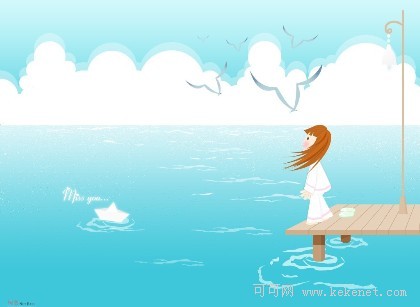
Charles saw them both at the same time: a small white bird and the girl wheeling down the walk. The bird glided downward and rested in the grass; the girl directed the chair smoothly along the sunlit, shadowy walk. She stopped to watch the ducks on the pond and when she shoved the wheels again, Charles stood up. "May I push you?" he called, running across the grass to her. The white bird flew to the top of a tree.
查爾斯是在同一時刻看到他們倆的:一只白色的小鳥和坐著輪椅沿著小徑悠然而來的女孩。小鳥滑翔而下,棲息在草地上;女孩則平穩(wěn)地駕著輪椅,穿行在陽光下婆娑的樹影之間。她停下來看了看池塘里的鴨子,當她再次用手推動輪椅時,查爾斯一下子站了起來。“我來推你好嗎?”他一邊喊道,一邊穿過草地朝她奔去。那只小鳥嗖地飛上了樹梢。
It was mostly he who talked and he seemed afraid to stop for fear she'd ask him to leave her by herself. Nothing in her face had supported the idea of helplessness conveyed by the wheelchair, and he knew that his assistance was not viewed as a favor. He asked the cause of her handicap.
大部分時間都是他在喋喋不休,他似乎害怕話一停,她就會請他離開,好讓她獨自呆著。從她的臉上看不出有任何緣于輪椅的無助表情,因而他知道,他的幫助并沒有被看作是一種恩惠。他問起她致殘的原因。
"It was an automobile accident when I was 12," Amy explained.
“我12歲那年出了一場車禍,”艾米解釋說。
They went for lunch, and he would have felt awkward except that she knew completely how to take care of herself.
他們一起去吃午餐。幸好她能完全照料自己,不然他可就尷尬了。
"Do you live with someone?" he asked the next day when they met.
“你和什么人住在一起嗎?”第二天見面時他問。
"Just myself," she answered. Asking the question made him feel uneasy because of his own loneliness even though he was hoping for this answer.
“就我自己,”她答道。盡管他希望得到這樣一個答案,但是問這個問題仍然讓他有些不安,因為他自己也過得很孤獨。
He came to like to feel the white handles in his grasp, to walk between the two white-rimmed metal wheels. And he grew almost more familiar with the slight wave at the back of her hair than with her eyes or her mouth. Once, he said to the wave at the back of her hair, "I hope I'm the only chair-pusher in your life," but she had only smiled a little and her eyes had admitted nothing.
他開始喜歡把輪椅的白色手柄握在手里的感覺,喜歡在那兩只鑲有白邊的金屬輪子中間推車行走。他對她披在身后的、微微起伏的長發(fā)愈加熟悉,幾乎超過了對她的眼睛和嘴唇的熟悉程度。有一次,他對著她波浪一般起伏的長發(fā)說:“真希望我是你生命中惟一為你推輪椅的人。”但她只是莞爾一笑,眼里沒有任何表示。











